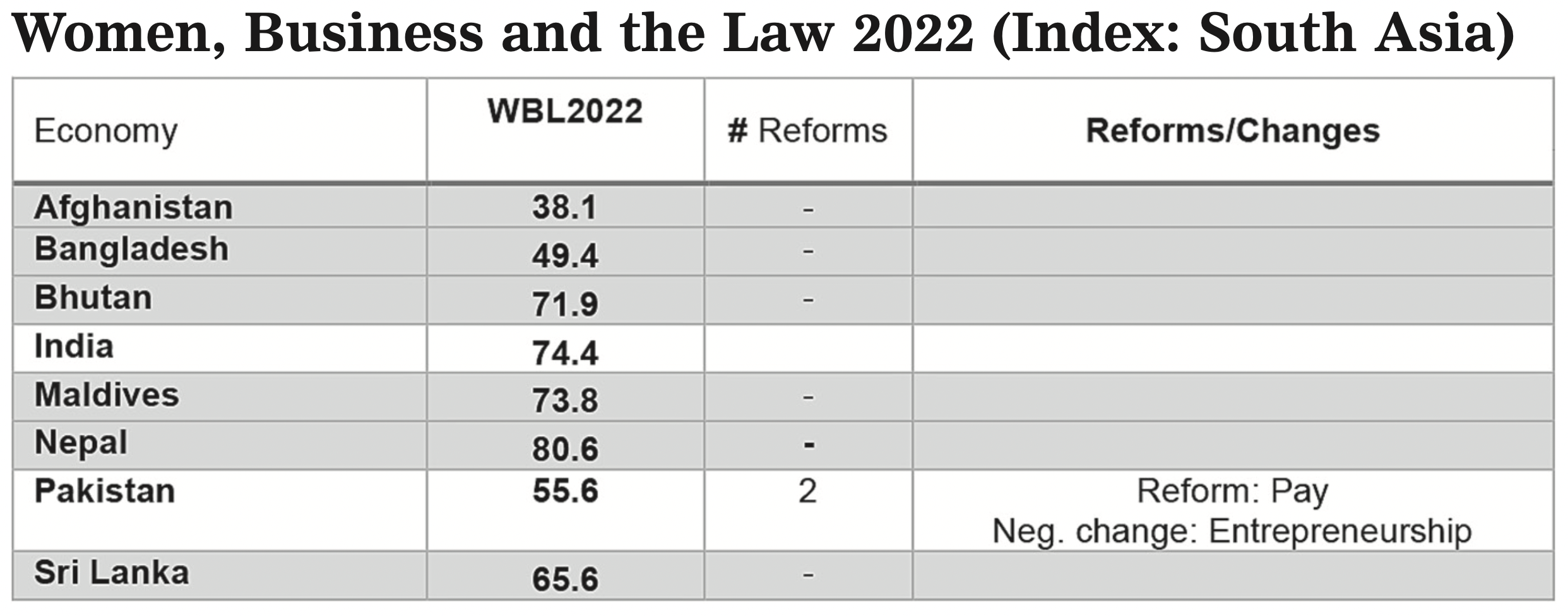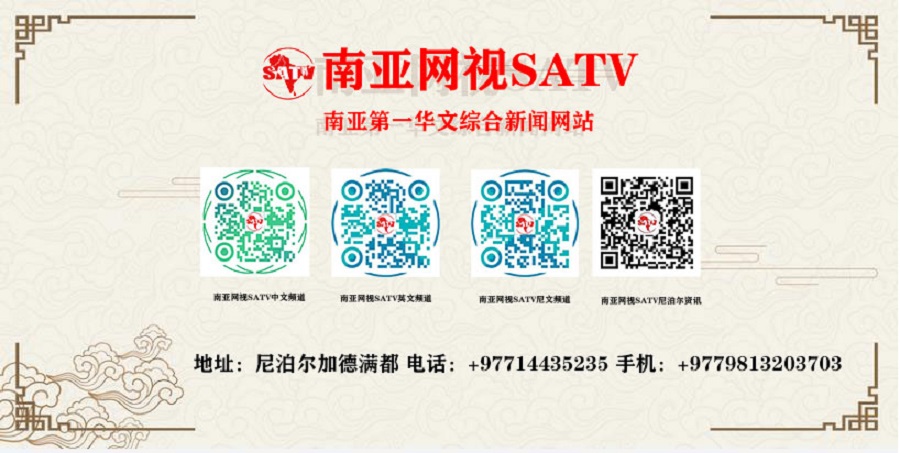
Nepal’s score for women’s entrepreneurship is 75 because the law does not prohibit gender-based discrimination in access to credit. Post File Photo
Nepal made the fastest progress among South Asian countries in closing gender-based gaps, according to a World Bank report released on Tuesday.
Amidst the global pandemic that threatened progress towards gender equality, the Himalayan republic outpaced all countries in the region in the Women, Business and the Law 2022 index with a score of 80.6 points out of 100.
As per the eighth series of the annual study entitled "Women, Business and the Law 2022", India scored 74.4 points, followed by the Maldives (73.8), Bhutan (71.9), Sri Lanka (65.6), Pakistan (55.6), Bangladesh (49.4) and Afghanistan (38.1) in closing the gaps between women and men in opportunities and outcomes.
Women, Business and the Law 2022 identifies the laws and regulations that restrict women’s economic opportunity in 190 economies. The index tracks the basics of movement in the community to the challenges of working, parenting and retiring. The data in Women, Business and Law 2022 are current as of October 1, 2021.
According to the report, the index score starts from 26.3 with the highest score being 100. A score of 100 means that women are on an equal legal standing with men across all areas measured.
It measures eight indicators—mobility, workplace, pay, marriage, parenthood, entrepreneurship, assets and pension.
According to the report, Nepal scored 100 out of 100 in three indicators. The country scored 100 points in workplace (that analyses laws affecting women’s decisions to work), 100 in pay (laws and regulations affecting women’s pay) and 100 in marriage (legal constraints related to marriage).
Nepal scored 75 in mobility (constraints on freedom of movement), 75 in entrepreneurship (constraints on women’s starting and running businesses) and 75 in pension (laws affecting the size of a woman’s pension).
The country scored 80 points in assets (that considers gender differences in property and inheritance).
There are some areas where Nepal has performed poorly towards closing gender-based gaps.
According to the report, Nepal scored 40 points in parenthood (that examines laws affecting women’s work after having children).
Under parenthood, the report has pointed out a lack of paid maternity leave of at least 14 weeks, government-administered maternity leave benefits, or paid parental leave.
The score for entrepreneurship is 75 because the law does not prohibit gender-based discrimination in access to credit.
“Unless women reach decision-making levels, the laws and regulations always impact women’s economic opportunities,” senior advocate Sabita Bhandari Baral of Nepal Law Firm told the Post. “Males are still at the decision-making level and female participation is still lacking.”
There is still a wide wage gap between female and male workers, according to a report published by the Central Bureau of Statistics in 2021.

Source: Women, Business and the Law DatabaseThe report titled “Analytical Report, Women in Business” said that one of the reasons why the cash income of females is less than that of male workers would be that not many female workers take up leadership positions and professional occupations.
Baral said that the law has provisioned breast-feeding in the workplace, but a very few workplaces have made such arrangements. The government should work on implementing it and establish free child-care centres, according to her.
Advocate Radhika Khatiwada, founder of Akarshan Law Firm and Research Centre, says women's situation in economic rights is still fragile.
“The economic provisions provided especially to women by the government are basically being enjoyed by men in the name of women as they are still kept busy doing household chores and raising children,” Khatiwada told the Post.
For instance, according to the Nepal Rastra Bank, a record 80,061 women entrepreneurs borrowed Rs73.85 billion in concessional loans from banks and financial institutions in the first six months of the current fiscal year. The move was aimed at making women participate in entrepreneurship, the bank said. But women entrepreneurs say men are taking advantage of these concessional loan schemes intended for women.
A World Bank report published in 2020 says that in Nepal, many businesses are registered in the name of women specifically to secure government subsidies given to them.
"Women still lag behind in financial literacy and most of the decisions regarding finances are taken by men either in the family or business," Khatiwada said.
According to the "Financial Access Report 2021" published by the Nepal Rastra Bank, male account holders outnumber females by almost two to one. Among the total 29.92 million account holders in banks and financial institutions, 19.11 million are male and 10.61 million are female. There is a huge gap in the number of accounts between males and females.
A majority of income earners in most families are male, women have less access to finance. Even in urban areas, women participate less in financial management, and their fathers or husbands manage it for them
"The number of women owning real estate has increased. People started buying land in the name of women after the government offered discounts on registration fees," said Khatiwada. “If the government provides subsidies in other areas such as income tax, company registration and business transactions, this will encourage women to participate in economic activities.”
According to Khatiwada, the constitution says that economic rights should be provided to women, but they have to struggle in many ways for a single thing and small things.
On average, women worldwide have just three-quarters of the legal rights of men, the World Bank report said.
According to the report, Covid-19 has directly and disproportionately jeopardised women’s social and economic capabilities as they make up the majority of health, social service, and unpaid care workers. In addition, women continue to earn less than men for the same work. They also face a higher risk of violence in their homes.
Women are more likely than men to be not only in informal employment but also in the most precarious and low-paying categories of informal employment, in part because they lack equal access to education and health services, the report of the Central Bureau of Statistics said.
As a result of the Covid-19 pandemic and prolonged lockdown imposed in the past one and a half years, businesses run by women entrepreneurs are having a hard time staying afloat.
Lack of capital to buy raw materials, pay the workers, pay the rent and other expenses and repay loans as a result of slowed demand for their products has caused immense distress to women, ultimately forcing them to quit.
Gender equality in the law is also associated with better development outcomes, such as lower rates of vulnerable employment and extreme poverty among female workers.
According to the Women, Business and the Law report, discriminatory laws across the world continue to threaten not only women’s fundamental human rights, but also their economic security. Barriers to employment and entrepreneurship at every stage of life limit equality of opportunity, failing to adequately support working women.
The Nepal government levies a combined 29.5 percent tax on the import of sanitary pads, including 15 percent customs duty, 13 percent value added tax (VAT), and an additional 1.5 percent VAT on the customs duty.
Those advocating easy accessibility to sanitary pads have been saying that there is a need for policymakers to understand that the product is an essential item, not a luxury.
Experts say many working women often have to quit jobs for various reasons, sometimes after having children.
“Many working women have to quit their jobs after having children as most of them cannot afford child day care centres," said Khatiwada, the lawyer. "Many women even have to leave their entrepreneurship after not being able to find time for both business and raising children. There are few chances of returning to work once women leave work or career after having children."













